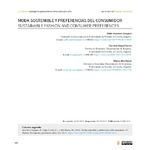Mostrar o rexistro simple do ítem
Moda sostenible y preferencias del consumidor
| dc.contributor.author | Sánchez Vázquez, Pablo | |
| dc.contributor.author | Gago-Cortés, Carmen | |
| dc.contributor.author | Alló, María | |
| dc.date.accessioned | 2020-10-06T07:52:39Z | |
| dc.date.available | 2020-10-06T07:52:39Z | |
| dc.date.issued | 2020 | |
| dc.identifier.citation | Sánchez-Vázquez, P., Gago-Cortés, C., y Alló-Pazos, M. (2020). Moda sostenible y preferencias del consumidor. 3C Empresa. Investigación y pensamiento crítico, 9(3), 39-57. https://doi.org/10.17993/3cemp.2020.090343.39-57 | es_ES |
| dc.identifier.issn | 2254-3376 | |
| dc.identifier.uri | http://hdl.handle.net/2183/26345 | |
| dc.description.abstract | [Resumen] En la actualidad existe una necesidad urgente de caminar hacia un modelo de crecimiento económico sostenible. En este sentido, los ciudadanos deben ser conscientes de que sus altos niveles de consumo tienen graves consecuencias a la hora de embarcarse en la senda del desarrollo sostenible. Este trabajo tiene como fin centrarse en el sector textil, en concreto, analiza el comportamiento de los consumidores hacia un nuevo concepto de moda, la Moda Lenta (ML). La ML se presenta como una alternativa responsable desde un doble punto de vista: social y ambiental. Su fin principal es cambiar el enfoque, pasar de valorar la cantidad de productos a la calidad de los mismos, aumentando por tanto el tiempo de uso de las prendas de vestir. La ML nace para hacer frente al modelo predominante en la actualidad, la moda rápida (MR). La MR se basa fundamentalmente en el establecimiento de precios bajos, diversidad de estilos y un tiempo de uso reducido con el consecuente impacto ambiental. El objetivo principal de este trabajo es analizar las preferencias de los consumidores hacia este nuevo modelo más social y ambientalmente responsable. Para ello, se ha realizado un cuestionario y se ha encontrado que las mujeres y los consumidores que compran con frecuencia a través de internet tienen una mayor disposición a pagar precios más altos por este tipo de prendas de vestir. Por el contrario, los consumidores con rentas más altas destacan que no se sentirían socialmente aceptados con este tipo de prenda. | es_ES |
| dc.description.abstract | [Abstract] At present, there is an urgent need to move towards a model of sustainable economic growth. In this sense, citizens must be aware that their high levels of consumption have serious consequences when embarking on the path of sustainable development. This paper focuses on the textile sector. Specifically, it analyzes the behaviour of consumers towards a new concept of fashion, the Slow Fashion (SF). The SF is presented as a responsible alternative from a double point of view: social and environmental. Its main purpose is to change the focus, moving from quantity to quality, increasing, therefore, the time use of clothes. SF has born to face the current predominant model, the fast fashion (FF). The FF is based fundamentally on the establishment of low prices, diversity of styles and a reduced time of use with the consequent environmental impact. The main objective of this work is to analyze the preferences of consumers towards this new model, which is more socially and environmentally responsible. In order to achieve this goal, a questionnaire has been conducted and through the analysis of data, results show that women and consumers who frequently buy online have a greater willingness to pay higher prices for this type of clothing. On the contrary, consumers with higher income emphasize that they would not feel socially accepted with this type of garment. | es_ES |
| dc.language.iso | spa | es_ES |
| dc.relation.uri | https://doi.org/10.17993/3cemp.2020.090343.39-57 | es_ES |
| dc.rights | Atribución-NoComercial 4.0 Internacional | es_ES |
| dc.rights.uri | http://creativecommons.org/licenses/by-nc/4.0/ | * |
| dc.subject | Textil | es_ES |
| dc.subject | Moda | es_ES |
| dc.subject | Preferencias | es_ES |
| dc.subject | Consumidor | es_ES |
| dc.subject | Sostenibilidad | es_ES |
| dc.subject | Textile | es_ES |
| dc.subject | Fashion | es_ES |
| dc.subject | Consumer | es_ES |
| dc.subject | Preferences | es_ES |
| dc.subject | Sustainability | es_ES |
| dc.title | Moda sostenible y preferencias del consumidor | es_ES |
| dc.title.alternative | Sustainable Fashion and Consumer Preferences | es_ES |
| dc.type | info:eu-repo/semantics/article | es_ES |
| dc.rights.access | info:eu-repo/semantics/openAccess | es_ES |
| UDC.journalTitle | 3C Empresa. Investigación y pensamiento crítico | es_ES |
| UDC.volume | 9 | es_ES |
| UDC.issue | 3 | es_ES |
| UDC.startPage | 39 | es_ES |
| UDC.endPage | 57 | es_ES |
| dc.identifier.doi | 10.17993/3cemp.2020.090343.39-57 |
Ficheiros no ítem
Este ítem aparece na(s) seguinte(s) colección(s)
-
GI-EDaSS - Artigos [29]






